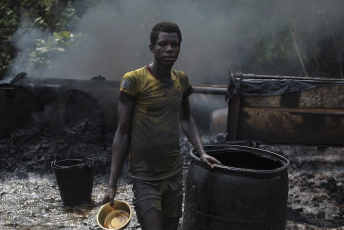Nairobi, Kenya – Migrant workers lured by jobs in the Middle East are instead being trafficked into forced labour and modern-day slavery by organised criminal networks.
Illicit human movement networks are active and growing in Kenya despite government labour migration regulations and legislation that criminalises human trafficking. These are among the findings of new research into human trafficking and human smuggling by the ENACT organised crime programme. ENACT is funded by the European Union (EU) and implemented by the Institute for Security Studies (ISS), INTERPOL and the Global Initiative against Transnational Organised Crime.
‘Human trafficking is modern-day slavery and efforts to control or halt it have been inadequate,’ says ENACT Researcher Mohamed Daghar at the ISS’ Nairobi office.
Human trafficking in the form of labour exports to the Middle East is prevalent in Kenya. More than 90% of workers interviewed by ENACT had been exploited. Grievances included sexual harassment, physical and verbal abuse, denial of medical attention, long working hours, restrictions on movement and communication, and inadequate food and accommodation.
ENACT identified 12 unlicensed agencies which had collectively recruited more than 2 000 Kenyans. They operate from private homes or frequently move offices, making them difficult to trace.
A 2014 ban on foreign recruitment of Kenyans was lifted in 2017 after human trafficking was criminalised and labour migration regulated, but unscrupulous traffickers responded by going underground. The organised criminal industry of exploitative human movement stayed active and continued to grow, driven by security, business and political elites.
The rise of human trafficking networks is due to lack of legal protection and operational insight, ENACT says. Kenya has many labour laws, but they don’t refer directly to labour exportation and don’t protect migrant workers.
Labour migration regulations also lack coordination, which weakens enforcement and exposes trafficking victims to criminals. As a result, there are few prosecutions and almost no convictions.
People interviewed by ENACT said there appeared to be little interest in addressing the problem because it mostly affects unskilled, rural and low-income people. No unlicensed local employment agency has been prosecuted to date, and no criminals involved in trafficking have been sentenced.
A shift in approach and a foreign employment policy is required if Kenya is to protect its workers abroad and combat transnational organised crime, Daghar says. Government should target organised crime networks and enhance police and judicial capacity to arrest and prosecute human traffickers.
Kenya should sign bilateral labour agreements with labour destination countries, and send labour attachés to countries with a significant presence of Kenyan migrant workers.
Read the research reports here:
The new slavery: Kenyan workers in the Middle East
Criminalisation of human smuggling in Africa: looking at the law
Human smuggling in Africa: rethinking responses
Human smuggling in Africa: the creation of a new criminalised economy?
For more information and interviews:
For interviews on human trafficking, contact Mohamed Daghar, ISS: +254 737128999;
For interviews on human smuggling, contact Lucia Bird, GI: [email protected]







